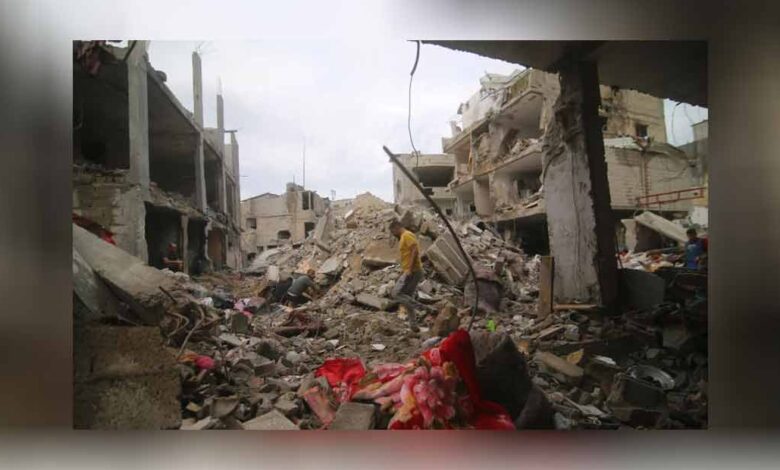
Israel Bombards Downtown Gaza City
On Tuesday, Israel launched a bombardment on downtown Gaza City and continued to mobilize a large number of reservists, vowing to retaliate strongly against the Hamas militant group. This left the residents of the small Palestinian territory with few options.
Four days after Hamas militants entered Israel, engaging in gunfights in its streets for the first time in decades, Israel’s military announced on Tuesday morning that it had regained control of its southern region and border.
The conflict has already claimed a significant number of lives on both sides, with estimates reaching at least 1,600 casualties, and possibly many more. Israel has also reported that Hamas and other militant groups in Gaza are holding over 150 soldiers and civilians as hostages.
The situation is expected to escalate further as Israel expanded its mobilization of reservists to 360,000 on Tuesday. A critical question looms about whether Israel will launch a ground offensive into Gaza, a narrow strip of land housing 2.3 million people, wedged between Israel, Egypt, and the Mediterranean, and governed by Hamas since 2007.
While U.N. agencies called for a humanitarian corridor to bring in essential supplies, the Israeli military targeted numerous locations overnight in Gaza City’s Rimal neighborhood, which includes government offices, universities, media organizations, and aid agencies.
After a relentless series of attacks, residents emerged at daybreak to find buildings destroyed by airstrikes, cars flattened, and streets transformed into scenes resembling a lunar landscape.
The devastation in Rimal seemed to indicate a new Israeli strategy: warning civilians to evacuate certain areas and then subjecting those areas to intense attacks. On Tuesday afternoon, the military issued another warning for residents of a different neighborhood in Gaza City to evacuate.
If these airstrikes persist, Gaza’s civilian population will have fewer safe places to shelter as more neighborhoods become uninhabitable, and escape becomes increasingly challenging. Since Hamas took control, Israel and Egypt have tightly restricted the flow of goods and people in and out of Gaza.
Now, Israel is declaring a complete siege on Gaza, cutting off fuel, food, and electricity. Meanwhile, Hamas claimed that Israeli strikes had rendered the Rafah crossing into Egypt, the only other exit besides the sealed Israeli side, impassable.
The ongoing bombardments and Israel’s threats to oust Hamas raise questions about the group’s strategy and goals. Hamas leaders have not publicly discussed whether they anticipated such a fierce retaliation from Israel when they launched the weekend attack.
In response to Israel’s aerial attacks, the spokesman for Hamas’ armed wing, Abu Obeida, stated on Monday night that the group would kill an Israeli civilian captive every time Israel targeted civilians in Gaza homes without prior warning.
The United Nations reported on Tuesday that over 187,000 people had fled their homes in Gaza, the largest displacement since a 2014 Israeli air and ground offensive displaced approximately 400,000 people.
UNRWA, the U.N. agency for Palestinian refugees, is accommodating more than 137,000 people in schools across Gaza, while families have taken in around 41,000 others.
The Israeli military reported over 900 deaths in Israel, while Gaza authorities reported 765 casualties, with Israel claiming that many of them were Hamas fighters. Both sides have witnessed thousands of injuries.
Approximately 1,500 Hamas militants’ bodies were found in Israeli territory, but it was unclear whether these numbers overlapped with deaths previously reported by Palestinian authorities.
The unexpected weekend attack by Hamas resulted in a death toll unseen since the 1973 war with Egypt and Syria, albeit over a more extended period. Notably, the weekend attack resulted in a high number of civilian casualties.
Calls to crush Hamas at any cost have grown, as opposed to continuing efforts to contain it in Gaza. Israel is currently led by one of its most hard-right governments, dominated by ministers staunchly opposing Palestinian statehood.
Israeli Defense Minister Yoav Gallant ordered a “complete siege” on Gaza on Monday. Jan Egeland, secretary-general of the Norwegian Refugee Council, warned that such a siege would be catastrophic for Gazans, potentially constituting war crimes due to collective punishment and the lack of essential resources.
Hamas has declared readiness for a protracted conflict against Israel, while desperation has increased among Palestinians, many of whom feel they have nothing to lose under continuous Israeli control and increasing settler activities in the West Bank, along with the blockade in Gaza, and perceived global indifference.








































